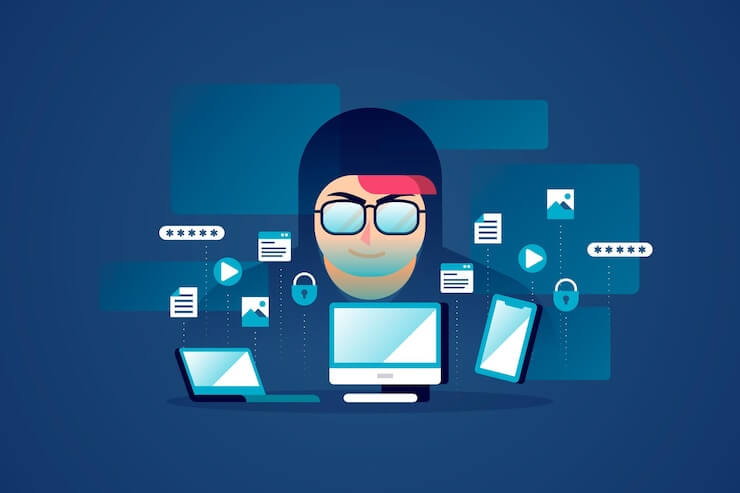In today’s digital age, where nearly every action you take online is tracked, privacy and anonymity have become critical concerns. Whether you’re shopping, chatting with friends, or simply browsing, there’s a digital footprint you’re leaving behind that companies and even governments can follow.
As the internet continues to evolve, the need to stay anonymous grows more pressing. But how do you maintain your privacy in a world designed to track every click?
In this article, I’ll walk you through the top ways to stay anonymous online in 2024, using tools and strategies that can keep your identity safe.
1. Use a Virtual Private Network (VPN)
A VPN is one of the most effective tools for maintaining online anonymity. When you connect to the internet through a VPN, your IP address—your digital identity—is hidden and replaced with the VPN server’s IP address. This masks your real location and identity, making it much harder for websites or hackers to track your online activity.
How to choose a good VPN:
- No-logs policy: Make sure the VPN doesn’t keep a record of your activities.
- Strong encryption: The best VPNs use military-grade encryption to ensure that your data is safe.
- Multiple server locations: The more countries the VPN offers, the more options you have to appear as though you’re browsing from different locations.
Many free VPNs sound appealing but be cautious—they often track your data or bombard you with ads, which defeats the purpose. Instead, opt for a reputable, paid VPN service that prioritizes your privacy.
2. Opt for Encrypted Communication
Encryption is the backbone of secure communication. If you’re concerned about keeping your chats, emails, and calls private, you should always opt for services that offer end-to-end encryption. This ensures that only you and the recipient can read the messages.
Recommended encrypted communication platforms:
- Signal: This app offers secure messaging and calling with end-to-end encryption, meaning even the platform itself can’t read your conversations.
- ProtonMail: A secure email service that provides end-to-end encryption, protecting your messages from prying eyes.
- Threema: A lesser-known but highly secure messaging app that doesn’t require a phone number, adding an extra layer of anonymity.
By using these encrypted services, you can communicate without worrying about your data being intercepted or exposed to third parties.
3. Use Anonymous Browsing Tools
Even if you’re using a VPN, your browser can still give away information about your identity. This is where anonymous browsing tools come into play. Browsers like Tor (The Onion Router) are designed to hide your activity by routing your traffic through multiple servers across the world, effectively scrambling your online footprint.
How Tor works: When you access the internet through Tor, your data gets bounced through a series of volunteer-operated servers, called nodes, making it extremely difficult for anyone to trace your activity back to you. Tor also helps you access content that might be restricted in your location, without revealing your true identity.
However, using Tor doesn’t mean you’re completely invisible. Websites can still track you through cookies or fingerprinting techniques. For best results, use Tor in combination with privacy-focused browsers and extensions like uBlock Origin or Privacy Badger to block trackers.
4. Use Cryptocurrency for Payments
One of the easiest ways to give away your identity is by using traditional payment methods like credit cards or PayPal. These systems require you to share your name, billing address, and other personal details—none of which are private. To stay truly anonymous, consider using cryptocurrencies like Bitcoin or Monero.
Why cryptocurrencies?
- Decentralized: Unlike traditional banking systems, cryptocurrencies are decentralized, meaning they don’t rely on third parties (like banks or governments) that might track your transactions.
- Pseudonymous: While not completely anonymous, cryptocurrencies allow you to make purchases without directly linking your identity. Tools like coin mixers can help further obscure the origin of your funds.
- Monero: If you’re serious about anonymity, consider using privacy-focused cryptocurrencies like Monero, which hide sender, receiver, and transaction amount information.
Cryptocurrencies are especially useful when purchasing privacy-related tools, services, or even memberships to privacy-focused websites that help protect your identity.
5. Create a Fake Identity for Online Activities
Now, here’s where it gets interesting—and a bit tricky. In some situations, protecting your privacy may require using alternative identities. Many people opt for creating secondary online personas for less critical tasks, but what about when you need a more robust form of anonymity?
Using a Fake ID (Smartly and Responsibly) In certain cases, using a fake ID can be a practical way to keep your personal information private, especially in areas where privacy matters the most. While this can sound alarming, many legitimate users, including activists, journalists, and privacy-conscious individuals, might need such a tool to remain under the radar in oppressive environments. A fake ID offers a buffer between your real identity and the services or subscriptions you’re using, especially if you’re in a region with strict surveillance or where freedom of expression is limited.
For example, if you’re signing up for a service that requires identity verification and you’re concerned about your privacy, having a well-crafted fake ID can give you peace of mind. This can be especially important when making anonymous purchases or accessing restricted content where your real identity may expose you to risks.
That said, it’s important to be aware of the legal implications. Always ensure that the purpose of using a fake ID is within the bounds of the law. Most privacy-conscious users use these tools in environments where their safety and personal information are at risk rather than for illegal activities.
6. Disable Tracking and Cookies
Most websites track your activity through cookies and other scripts. These cookies help websites remember your preferences, but they can also track your browsing habits across multiple sites. If you want to stay anonymous, consider disabling cookies or using browser extensions that block trackers.
Recommended tools to block trackers:
- uBlock Origin: This browser extension helps block ads, trackers, and other unwanted scripts.
- Privacy Badger: Developed by the Electronic Frontier Foundation, this tool automatically learns to block invisible trackers.
- Ghostery: This extension gives you more insight into what companies are tracking you and allows you to block them with one click.
By disabling cookies and using tracker-blocking tools, you can significantly reduce the amount of personal data websites collect on you.
7. Stay Wary of Public Wi-Fi
Public Wi-Fi networks are notoriously insecure. Whether you’re at a café, airport, or library, hackers can easily intercept your traffic if you’re connected to the same network. To stay safe and anonymous on public Wi-Fi, always use a VPN to encrypt your connection.
How to use public Wi-Fi safely:
- Always connect through a VPN: This ensures that even if someone intercepts your data, it will be encrypted.
- Avoid sensitive activities: Don’t log into important accounts or access sensitive information while on public networks.
By taking these precautions, you can prevent cybercriminals from snooping on your data when you’re connected to unsecured Wi-Fi.
Conclusion
Maintaining your anonymity online is more important than ever in 2024. With the right combination of tools—like VPNs, encrypted communication platforms, anonymous browsing methods, and even alternative forms of identification—you can significantly reduce the risk of being tracked. Whether you’re safeguarding your privacy from corporations, hackers, or even governments, the steps outlined in this guide will help you protect your online identity and enjoy a safer, more private internet experience.
Remember, the key to staying anonymous is to layer these tools and strategies together.



